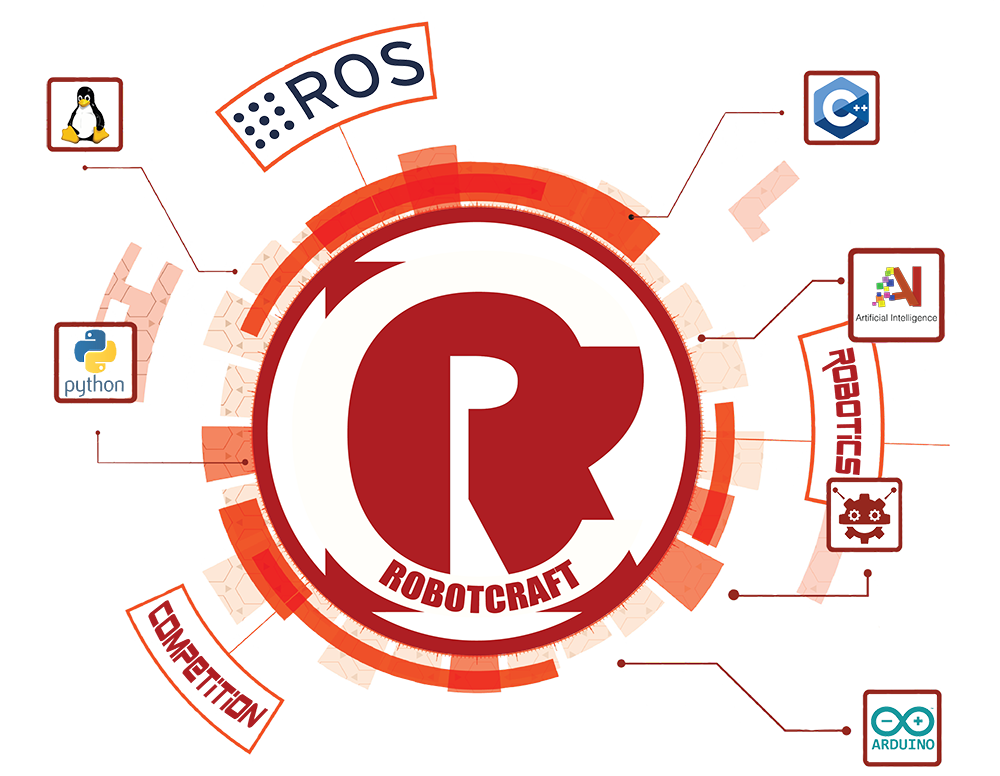
Attendance
Intern’s attendance is assessed using the unique RFID cards used as individual identification. To obtain the certificate, the intern must comply with the following attendance:
• Lessons (theoretical classes, seminars, workshops, etc.): 60 out of 84 hours
• Laboratory: 24 out of 36 hours (4 out of 6 week laboratories)*
* Attendance outside predefined laboratory days do not make up for missing laboratories.
• Lessons (theoretical classes, seminars, workshops, etc.): 60 out of 84 hours
• Laboratory: 24 out of 36 hours (4 out of 6 week laboratories)*
* Attendance outside predefined laboratory days do not make up for missing laboratories.
PROGRAMME
Craft #1 (C1): Introduction to Robotics (4,5h T)
Presentation of lecturers, mentors and interns (T);
Presentation of RobotCraft 2025 and the different crafts it comprises (T);
Introduction to robotics, describing the history of robotics and its evolution (T);
Presenting mobile robot morphologies, namely sensors and actuators (T);
Brief literature review related to robotics, presenting the necessary basic theoretical concepts (T);
Presentation of RobotCraft 2025 and the different crafts it comprises (T);
Introduction to robotics, describing the history of robotics and its evolution (T);
Presenting mobile robot morphologies, namely sensors and actuators (T);
Brief literature review related to robotics, presenting the necessary basic theoretical concepts (T);
Craft #2 (C2): Introduction to Programming (16,5h T)
Introduction to C/C++ programming (T);
Craft #3 (C3): Mecatronics (6h T | 6h L | 6h H)
Introduction to electromechanics in mobile robotics (T);
Electromechanical assembly of the mobile robotic platform (L).
Electromechanical assembly of the mobile robotic platform (L).
Craft #4 (C4): Mobile Robotics Programming (12h T | 12h L | 12h H)
Introduction to C language applied to Arduino programming (T);
Describe the features of Arduino solutions and ATMEL microcontroller (e.g., hardware architecture, cycles, pin configuration, communications), using the Arduino Mega board (T);
Identify the different wireless communication technologies used in robotics (e.g., RF, Bluetooth, AdHoc, ZigBee) (T);
Introduction to low-level algorithms, flowcharts and pseudocode (T);
Acquire skills in the sensor and actuator practice used in robotics (T | L);
Develop a typical differential kinematic application using Arduino Mega (L | H).
Describe the features of Arduino solutions and ATMEL microcontroller (e.g., hardware architecture, cycles, pin configuration, communications), using the Arduino Mega board (T);
Identify the different wireless communication technologies used in robotics (e.g., RF, Bluetooth, AdHoc, ZigBee) (T);
Introduction to low-level algorithms, flowcharts and pseudocode (T);
Acquire skills in the sensor and actuator practice used in robotics (T | L);
Develop a typical differential kinematic application using Arduino Mega (L | H).
Craft #5 (C5): Introduction to Linux (12h T)
Introduction to Linux OS (T);
Craft #6 (C6): Robot Operating System (24h T | 12h L | 12h H)
Introduction to ROS (T);
Describe ROS features (e.g., stacks, publish-subscribe, topics, rosserial), and provide specific examples and case studies (T);
Present ROS-compatible simulators, such as Morse, Stage and Gazebo (T);
Introduction to high-level algorithms, flowcharts and pseudocode (T);
Follow ROS tutorial under simulation environment (T | L);
Explore rosserial for Arduino – ROS communication (T | L);
Develop a typical remote sensing application using both Arduino and ROS (L | H).
Describe ROS features (e.g., stacks, publish-subscribe, topics, rosserial), and provide specific examples and case studies (T);
Present ROS-compatible simulators, such as Morse, Stage and Gazebo (T);
Introduction to high-level algorithms, flowcharts and pseudocode (T);
Follow ROS tutorial under simulation environment (T | L);
Explore rosserial for Arduino – ROS communication (T | L);
Develop a typical remote sensing application using both Arduino and ROS (L | H).
Craft #7 (C7): Artificial Intelligence (6h T | 6h L | 6h H)
Introduction to Artificial Intelligence, presenting different paradigms and some real applications (T);
Introduction and importance of integrating biologically-inspired models in robotics (T);
Formalizing a mobile robotic approach, devising biologically-inspired algorithms and finite-state machines (T | L);
Develop a streaming architecture to exchange all necessary data between Arduino Mega and Raspberry Pi 3 (e.g., sensor readings, encoders readings, actuators control, etc.) (L | H);
Introduction and importance of integrating biologically-inspired models in robotics (T);
Formalizing a mobile robotic approach, devising biologically-inspired algorithms and finite-state machines (T | L);
Develop a streaming architecture to exchange all necessary data between Arduino Mega and Raspberry Pi 3 (e.g., sensor readings, encoders readings, actuators control, etc.) (L | H);
Craft #8 (C8): Competition (6h T | 27h O)
Discussion of the competitive events, rules and prizes (T);
Consolidate concepts learned over all crafts and test the mobile robotic platform under a specific scenario (O).
Consolidate concepts learned over all crafts and test the mobile robotic platform under a specific scenario (O).

